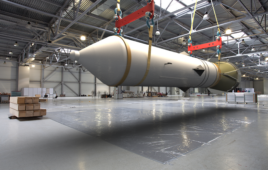Bombardier’s CSeries planes could resume flight testing in a few weeks after the plane’s engine manufacturer believes it has found the cause of an incident a week ago that grounded the four test aircraft.
“We believe it is not going to have a significant impact on the testing schedule and we’re working now with Bombardier on a plan to resume testing here in the next few weeks, we hope,” Greg Hayes, chief financial officer of Pratt & Whitney parent company United Technologies told a Chicago investors conference Thursday.
“We believe we have an understanding of what occurred and, if we’re correct, we think it can be rapidly fixed,” Hayes said.
Hayes said a preliminary analysis of the engine confirms the incident wasn’t related to the engine’s design, which features a geared fan that drives the aircraft’s fuel-savings advantage.
“We think it was something much more simple than that and, again, it gives us confidence this is not going to be a significant financial exposure for UTC.”
One of the CSeries’ two engines that malfunctioned was sent to the United States for a detailed investigation.
UTC has invested more than US$5 billion on the engine program that will be used for several aircraft, including CSeries, Airbus narrowbodies and Mitsubishi regional jet.
Bombardier (TSX:BBD.B) spokesman Marc Duchesne called UTC’s findings “positive.”
“We’re listening to what they’re saying and it’s a positive sign, definitely,” he said in an interview.
Bombardier hopes to disclose in the coming days more details about the engine incident and timing for a return to flight testing. In the meantime, the remaining three test aircraft are doing ground testing.
The aircraft have flown nearly 330 hours of testing, well short of the 2,400 required to receive Transport Canada certification. The company expects to get some credit for ground testing and anticipates flight hours will pick up as the seven test airplanes, each with different missions, take to the air.
Chief executive Pierre Beaudoin told reporters on Monday that he believes the new passenger jet will be ready for service as planned next year despite the engine incident.
“I can understand that people would ask questions when there is an event like this…but we feel confident that we’ll find the problem rapidly with Pratt & Whitney and that we’ll be able to meet our schedule to entry into service in the second half of 2015,” he said.
He added that has “absolute confidence” in the engine that was certified by Transport Canada in February 2013.
Bombardier’s shares were hit following the incident and some analysts have said they expected them to remain under pressure until the cause of the engine problem is determined.
On the Toronto Stock Exchange, Bombardier shares were unchanged at C$3.70 in Thursday midday trading.
Analysts have said the latest CSeries setback has aggravated concerns about the slow flight test program and calls into question its development program.
Kevin Chiang of CIBC World Markets has said the “best-case scenario” is if the engine problem is restricted to the first test aircraft, especially since the engine has completed thousands of hours of testing and that engine-related incidents are not uncommon during flight testing.
The US$4.4-billion CSeries program is expected to generate US$5 billion to US$8 billion a year in revenues at maturity and help improve overall profitability for Bombardier, Canada’s largest aerospace company and one of the world’s top producers of aircraft for commercial airlines and the business sector.
Meanwhile, Hayes told the Deutsche Bank Global Industrials and Basic Materials Conference that it anticipates strong growth for its commercial aerospace business as a growing global middle class boosts traffic, prompting airlines to buy new planes and replace aging fleets.
Only 16 per cent of the world’s population have ever flown on an aircraft, but demand is expected to be sparked as the middle class surges over the next two decades to include two-thirds of the population. He said about 30,000 new aircraft will be purchase in the next 20 years.
Although the International Air Transportation Association has lowered its profitability forecasts, it still expects the worlds’ airlines will generate US$18 billion of profits this year. Hayes said four straight years of airline profits will allow carriers to buy spare parts and drive UTC sales.
Hayes also noted that UTC will take a nearly US$500 million charge in the second quarter for the Canadian Maritime Helicopter program. Sources say the Harper government has reached a deal to amend its contract with the U.S. manufacturer of the long-delayed CH-148 Cyclone maritime helicopters. The military version of Sikorsky’s S-92 helicopter won’t be fully operational until 2018.
Filed Under: Aerospace + defense




